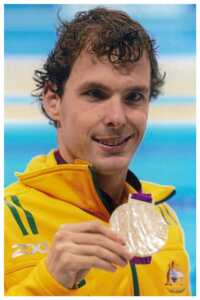Matt Levy on assistive technology, Paralympics and winning gold
News | September 10, 2024
As an Australian Paralympian, I’ve experienced firsthand the profound impact that assistive devices can have on the lives of individuals with disabilities. I would not be who or where I am today without assistive technology – including winning gold for Australia!
However, my road to gold has had many challenges along the way. I had over 40 operations before I had even turned 16 as a result of cerebral palsy and a vision impairment that I was born with. There is absolutely no doubt in my mind that I would not have been able to manage daily life without a wheelchair and wheelchair access or vision impaired aids. And I certainly would not have become a competitive swimmer, winning gold, silver and bronze medals at the Paralympics.
Getting access to the right assistive technology is not always easy in Australia but, overall, in countries like ours, around 85-95 percent of people who need that support can access it. In contrast, in less well-off countries – like those in the Pacific – only a shocking 5-15 percent of people can access that support. That means the road to reaching their potential is so much harder for people with disabilities in our region, let alone the road to athletic excellence and achievement.
This year, there were 13 athletes representing six Pacific nations in the 2024 Paralympics – the largest group ever. Thinking about my journey to get the right supports and unlocking my potential both in the pool and out, and what my peers in other countries face, it is so clear to me that it is vital to keep supporting our neighbours.
Recent surveys and reports have shown that many countries in the region are facing severe shortages of essential assistive devices like wheelchairs, hearing aids, and prosthetics. This is alongside global reporting stating one in three people need at least one assistive product – that’s an estimated 2.4 billion people around the globe.
These nations, often with remote and dispersed populations, face both logistical and financial challenges that hinder the availability and distribution of assistive devices. The most common barriers to accessing assistive products widely are the high cost of the device, low availability and lack of support services to provide and maintain the device and its use. For many, a wheelchair or hearing aid is out of reach.
Assistive technology is not a one-size-fits-all solution; devices need to be appropriate for both the user and their environment. Poor fitting, old or devices that are not fit for the terrain can cause more problems than they solve.
We are out to change that, to unlock the everyday, for everyone.
The World Health Organization estimates that 16 percent of the global population currently lives with some form of disability. We need a concerted effort on several fronts. First and foremost, there must be increased funding and resources dedicated to assistive technology in the Pacific. Governments, international organizations, the private sector, and civil society organisations all need to collaborate to create robust funding mechanisms and resource-sharing frameworks. This collective effort should prioritise access to assistive devices to those who need them most.
Developing local manufacturing capabilities can also make a big difference. Training local technicians and establishing repair and maintenance services will ensure devices remain functional and continue to serve their purpose over time.
Raising awareness about the needs of individuals with disabilities and advocating for their rights is equally important.

As someone who has benefited immensely from assistive technology, I believe that addressing the lack of access to these devices in the Pacific is not just a regional issue but a global responsibility. By coming together and taking comprehensive action, we can significantly improve the lives of many Pacific Islanders, fostering a more inclusive and equitable world for all.
Learning to walk was difficult and challenging enough, but with expert help and assistive devices, I was able to improve much faster. Something that simply is not possible in many of our neighbour countries.
Earlier this year, kit bags filled with items for our Paris-bound Australian Paralympic Team were sent to Vanuatu, providing the Pacific Island nation’s Paralympic hopefuls with the equipment that could prove the difference in their quest to compete on the biggest stage in world Para-sport.
Assistive technologies are not luxuries, they are lifelines for enabling individuals like myself to live independently, participate fully in society, and unlock their potential – and even win gold!
Growing up, I was able to enjoy learning to swim which led me to compete for my country. Swimming became a crucial part of my rehabilitation, helping me keep my body active and unlock my potential. This helped me gain independence and confidence in everyday life. Something everybody deserves.
You can join me in calling on the Australian Government to take action to unlock the everyday, for everyone, here.
***
Matt Levy is a former Paralympic Swimmer and five times Olympic Games representative. He is the author of several books including Going the Distance. He is also on the board of the NSW Swimming Directors and on the Australian Sporting Alliance for People with a Disability (ASAPD) and the Para Athlete representative on the Commonwealth Sport Athlete advisory group. Matt is a champion for the Australian Disability and Development Consortium as well supporter of the Unlock the Everyday campaign.
https://www.addc.org.au/news/paralympian-matt-levy-calls-for-an-increase-in-access-to-assistive-devices-for-our-pacific-neighbours
